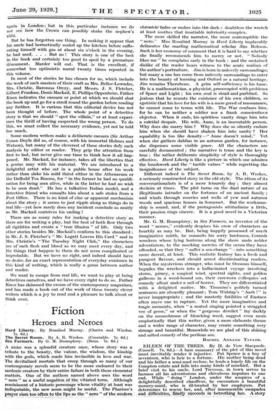Fiction
Heroes and Neroes
A HERO was a splendid creature once, whose story was a tribute to the beauty, the valour, the wisdom, the kinship with the gods, which made him invincible in love and war. The devitalized mortals that creep through so many of our contemporary novels seem to be the more endeared to their sardonic creators by their-entire failure in both these elemental matters. One of the authors named above uses the word " nero " as a useful negation:of the vitiated term. Although reminiscent of a historic personage WhoSe vitality at least was indisputable, the new noun might be useful. The Pharisee's
prayer rises too often to the lips as the " nero " of the Modern chronicle fades or' rushes into thb -dark doubtless the wretch at least soothes that insatiable inferiority-complex.
The more skilled the narrator, the more contemptible the " nero." Miss Rosalind Murray in Hard Liberty implacably delineates the snarling mathematical scholar Jim. Robson. Such is her economy of-comment that it is hard to say whether she finally recommends him to mercy or not. " Nobody lllces me " he complains early in the book ; and the sustained dislike of the reader bears witness to the acute realism of the author's portraiture. Jim is born in unlovely surroundings; but many a one has come from unlovely surroundings to enter into the beauty of learning and Oxford as a natural heritage. Jim remains Thersitean. A grim self-sufficiency is his bane. He is-a mathematician, a physicist, preoccupied with problems of Space and Light ; his own _soul is strait and purblind. So jealous that he resents the existence of his own children, so egotistic that his love for his wife is a mere greed of reassurance, he cannot come to terms with life. The War confuses him, for he can be neither a soldier nor a frank conscientious objector. When it ends, his spiritless vanity drags him into a suicidal despair. His wife, Anne, is an inscrutable person. Why does she marry him P Why does she so silently endure him when she should have shaken him into sanity ? Her equability is to like density—" Anne doesn't mind." Yet when she gathers dahlias in an autumn garden, for instance, she dispenses some visible grace. All the characters are carefully documented ; the narrative is tense and the key is true ; the rather deliberate simplicity of style is thoroughly effective. Hard Liberty is like a picture in which one admires the brushwork and the " tactile values " while regretting the insignificance of the subject.
Different indeed is The Secret Rciom, by A. R. Weekes, a seriously constructed story in the old style. The idiom of its conversationalists is of a more leisurely day ; they almost declaim at times. The plot turns on the dual nature of an illegitimate intruder on the fortunes of an ancient family ; and winds through roseries and walls of yew and autumn woods and spacious houses in Somerset. But the workman- ship is sound, and, if the protagonists attitudinize a little, their passionrings sincere. It is a good novel in a Victorian manner.
Mr. G. M. Boumphrey, in Sea Farmers, as inventor of the word " neroes," evidently despises his crew of characters as heartily as may be. But, being• happily possessed of much imaginative -mirth, he commits his sorry landsmen, Cornish wreckers whose lying lanterns along the shore undo nobler adventurers, to the mocking. mercies of the ocean they have offended, so that they " suffer a sea-change "—into something more decent, at last. This realistic fantasy has a fresh and pungent flavour, and should arrest discriminating readers. When the mysterious stranger, who must be Oceanus himself, beguiles the wreckers into a hallucinated voyage involving storm, piracy, a magical wind, spectral sights, and golden galleons in a weed-bound sea, their careworn colloquies' set comedy afloat' under a sail of horror. They are differentiated with a delighted malice. Mr. Timmins's politely turned sentences are absurdly pleasant ; Tom Widdup's " Aarh !" is never inappropriate ; and the masterly futilities of Eustace often move one to. rapture. Yet the more imaginative and tragic moments, when " a muted singing pointed a straggled vee of geese," or when the " gorgeous derelict " lay darkly on the monochrome of bleaching weed, suggest even more emphatically that this writer, given a more elaborate theme and a wider range of character, may create something very strange and beautiful. Meanwhile we are glad of this shining and salted comedy of the perilous sea.
RACHEL ANNAND TAYLOR.








































 Previous page
Previous page